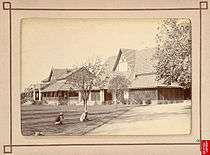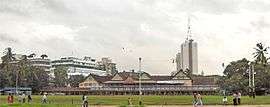Gymkhana
Gymkhana (Hindi: जिमख़ाना, Assamese: জিমখানা, Bengali: জিমখানা, Urdu: جِمخانہ, Sindhi: جمخانه) is an Indian term which originally referred to a place of assembly. The meaning then altered to denote a place where skill-based contests were held. "Gymkhana" is an Anglo-Indian expression, which is derived from the Persian word "Jamat-khana".[1] Most gymkhanas have a Gymkhana Club associated with them, a term coined during British Raj for gentlemen's club.

More generally, gymkhana refers to a social and sporting club in the Indian subcontinent, and in other Asian countries including Malaysia, Thailand, Burma and Singapore, as well as in East Africa.
Etymology

The first element of Gymkhana comes from gend meaning ball in Hindi/Hindustani/Khariboli. This element is distinct from English word gym, short for gymnasium and gymnastics which has Greek and Latin roots.[2] The second element, khānā (ख़ाना) has Indo-Persian or Indo-Arabic origin meaning a place or a compartment. In the Persian (خانه) it's a term for dwelling, house.[3]
See also
- List of India's gentlemen's clubs
- Hindu Gymkhana
- Bombay Gymkhana, Mumbai
- Delhi Gymkhana, Delhi
- Golaghat Gymkhana, Assam
- Chennai Gymkhana Club
- Madras Gymkhana Club, Chennai
- Gymkhana Ground, Rangoon, Myanmar
- Jamalpur Gymkhana, Bihar
- Jorhat Gymkhana Club, Assam
- Karachi Gymkhana Club, Pakistan
- Lahore Gymkhana Club, Pakistan
- Nairobi Gymkhana Club, Kenya
References
- MacMillan, Michael (1895). The Globe Trotter in India Two Hundred Years Ago: And Other Indian Studies. S. Sonnenschein & Company. p. 91.
- Oxford Dictionaries Gymnasium etymology
- From Loghat'nāmeh-ye Dehkhoda, Third Edition (Tehran University Press, 2006), quoted from Borhān-e Ghāte' by Mohammad Moin.
External links

- "Gymkhana". New International Encyclopedia. 1905.
- "Gymkhana". Encyclopædia Britannica (11th ed.). 1911.